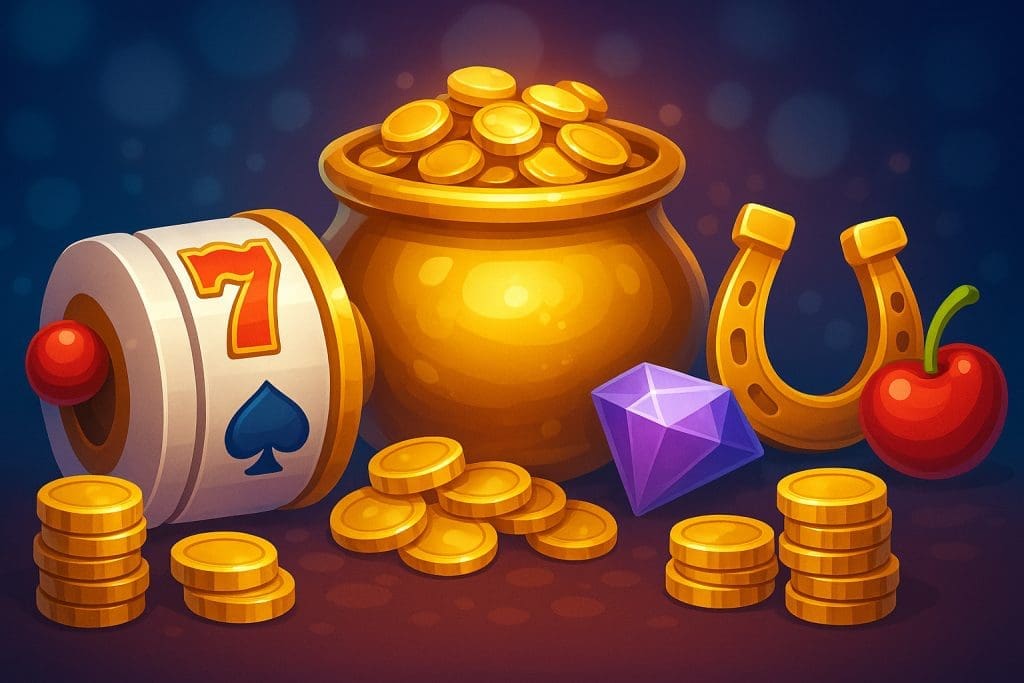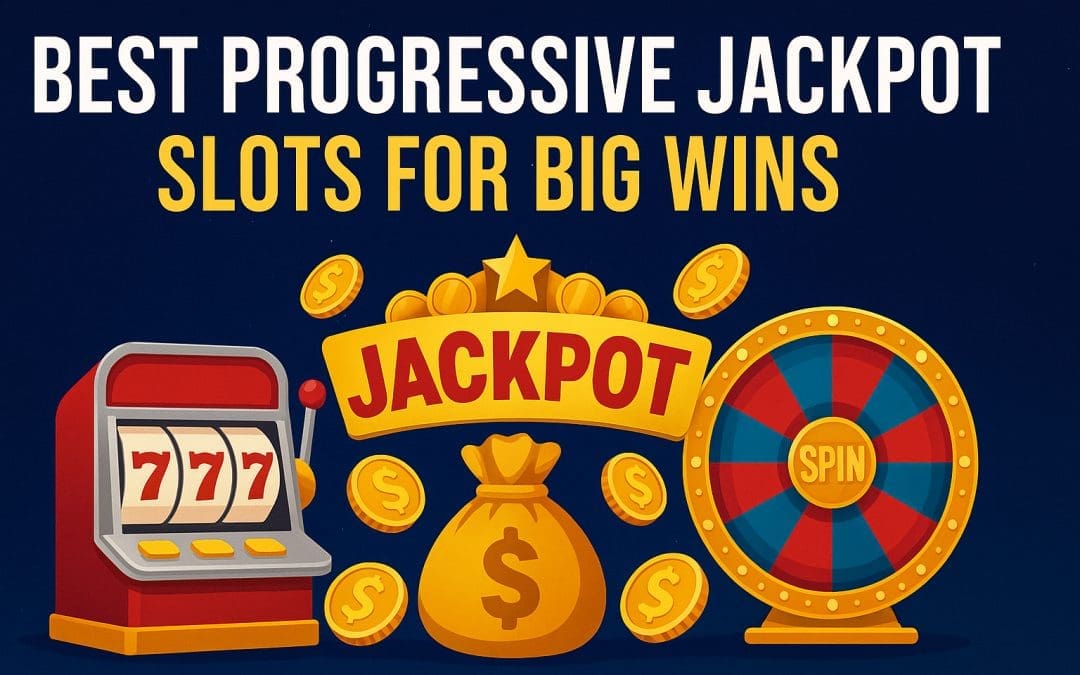There’s something almost hypnotic about watching a jackpot counter tick upwards while you’re spinning away. I remember sitting in a casino lounge once, half-distracted by my coffee, as a nearby screen showed Mega Moolah’s prize pool creeping past ten million. Everyone in the room kept glancing at it like it was some living creature that might suddenly roar. That’s the magic of progressive jackpot slots: you know the odds aren’t in your favor, yet you can’t help but lean in.
What Progressive Jackpot Slots Really Are
At the simplest level, a progressive jackpot slot is just a slot where the prize keeps growing until someone snags it. Instead of being capped at a fixed amount, the pot fattens with every spin placed by anyone, anywhere in the network. It’s like everyone in the world is tossing a coin into the same jar, and one day that jar bursts open for a single player.
If you’ve ever logged into a casino late at night and seen the jackpot rolling over seven digits, you’ll know the peculiar mix of excitement and disbelief: Could I actually be the one? Probably not… but maybe?
How Progressive Jackpots Work
Here’s the nuts and bolts. A small chunk of each bet is shaved off and fed straight into the progressive pool. That’s why the base game sometimes feels stingier than non-progressive slots: some of the return is being tucked away into the jackpot chest.
These jackpots can be local (just one casino), pooled (a group of sites under the same brand), or wide-area (the giants like Mega Moolah, which span dozens of casinos). The wide-area ones are the monsters — they gobble up bets from thousands of players across the globe. That’s how the numbers balloon so fast.
I once had a friend who swore by playing “only after midnight” because, in his mind, fewer players meant better odds. Of course, that’s not how randomness works, but watching him ritualize his jackpot hunts was half the fun.
Features That Make Progressives Feel Different
Progressive slots don’t just lure you in with a jackpot meter; they’re built to feel like mini-events:
- Flashy jackpot counters that update in real time.
- More than one prize tier — mini, major, mega — so you don’t feel left out if you don’t land the top one.
- Bonus rounds or quirky wheel spins that act as the golden ticket to the jackpot.
- Lower base payouts (that’s the trade-off for feeding the big pot).
- Themes that feel larger-than-life: gods, millionaires, genies, you name it.
They’re designed to tease, to keep your eyes darting back to that jackpot number. I’ve lost count of how many times I’ve muttered, “Just one more spin” while that glowing total stared me down.
Jackpot Structures and Networks
Think of the structure as the skeleton under the skin. NetEnt’s Hall of Gods splits its jackpots into three, which means more players walk away with something sizable. Playtech’s Jackpot King lets you play across a bunch of different titles, all contributing to one central jackpot. And then you have Microgaming’s WowPot and King Millions, which are like global carnival attractions: everyone gets a ticket, but only one person rides away with the prize.
There’s also this shared excitement. When someone in Canada or Finland hits the jackpot, you feel oddly connected to their win. I’ve seen chat rooms light up with congratulations for total strangers who just got lucky. It’s weirdly communal for a solitary game.
RTP, Volatility, and Paylines
If you’re used to high RTP games, progressives might sting a little. They usually sit lower, often in the 88–94% range, because part of the return is fueling that big shiny prize. And volatility? Through the roof. You can go through long dry spells, but when the game hits, it can hit hard.
Some are stripped-down classics like Jackpot 6000, with just a few reels and paylines. Others, like Bonanza Megapays, go full chaos mode with thousands of shifting paylines and cascading reels. It really depends on what kind of ride you’re after: slow and steady, or fast and unpredictable.
Bonus Features and Extras
Most progressives use a bonus feature as the entryway to the jackpot. Mega Moolah spins a colorful wheel. Hall of Gods makes you smash shields with Thor’s hammer. Genie Jackpots pops up with magical extras.
These little side games aren’t just filler. They soften the blow of not winning the main prize by offering multipliers, free spins, or smaller jackpots. I’ve had sessions where the “consolation” features actually made me forget I was chasing the big one.
The Heavy-Hitters: Top Progressive Slots
Mega Moolah
Love it or hate it, Mega Moolah is the poster child of progressive slots. The safari animals look like something from a mid-2000s cartoon, but players forgive that instantly when the wheel coughs up millions. It’s earned the nickname “Millionaire Maker” for good reason. One player bagged over $20 million, and people still talk about it like folklore.
Mega Fortune
Mega Fortune is NetEnt’s answer to the millionaire fantasy. Champagne, limos, yachts — the whole rich-and-fancy package. It once paid out over €17 million and held a Guinness record. I once joked to a friend that playing it was the cheapest way to own a yacht.
Bonanza Megapays
Big Time Gaming took its gold-mining megaways hit and bolted a progressive onto it. It’s chaotic, noisy, and brilliant if you like the unpredictability of cascading reels mixed with the thrill of a jackpot. Feels like dynamite in digital form.
Hall of Gods
Norse gods, massive hammers, and jackpots that can make your head spin. Hall of Gods is more than just a jackpot chase; the bonus round where you smash shields has a real “one more try” pull. It’s also known for its more attainable mid-tier prizes.
Genie Jackpots Wishmaker
Playtech’s Genie Jackpots Wishmaker ties into the Jackpot King system. It’s bright, flashy, and stuffed with features like wilds and expanding reels. I once had a session where the genie popped up three times in half an hour, and though I didn’t touch the jackpot, I walked away smiling. That’s how these games keep you hooked.
A Few Tips from the Trenches

You’ll hear all kinds of theories about “beating” progressives. Most of them are wishful thinking. But there are a couple of down-to-earth habits worth keeping in mind:
- Peek at the jackpot total before diving in. Some games feel more worth it once they’ve crossed a certain figure.
- Always bet enough to qualify for the jackpot trigger. Nothing stings more than hitting the bonus only to realize your stake was too low.
- Don’t lose sight of fun. If the jackpot is your only reason for playing, you’ll probably walk away disappointed most of the time.
- Stretch your bankroll. Smaller bets over a longer session give you more chances at triggering features.
- Stick with trusted providers and casinos. It sounds obvious, but fair play is everything when millions are on the line.
None of these tricks tip the math in your favor, but they do make the ride smoother.
The Big Providers
Microgaming still holds the crown with Mega Moolah and its spin-offs, plus WowPot and King Millions. NetEnt’s jackpot library remains iconic with Mega Fortune and Hall of Gods. Playtech’s Jackpot King keeps rolling out new titles, and Big Time Gaming has spiced things up with its Megapays system.
Meanwhile, newer names like Games Global and Yggdrasil are muscling in. Every year, more progressive slots appear, and the jackpots grow faster. It’s a crowded field, but that just means more games to chase — and more stories of someone, somewhere, landing the impossible.
FAQs About Progressive Jackpot Slots
Do I have to bet max to win the jackpot?
Sometimes yes, sometimes no. Mega Moolah doesn’t require max bets, but other games do. Always double-check the paytable so you don’t end up kicking yourself later.
Are progressive jackpot slots fair?
As long as you’re playing with licensed providers, yes. Randomness is audited, and the games aren’t “rigged” against you beyond the house edge built in.
How often do they actually pay out?
The monster jackpots, a few times a year. The smaller “daily” or “mini” jackpots? Those can pop off much more often, sometimes multiple times a day.
What’s the difference between local and network jackpots?
Local ones are casino-only, so they grow slower. Networked jackpots feed from many casinos, which is why they shoot into the millions.
Which slot has the biggest payout record?
Mega Moolah still holds the throne with a jaw-dropping $20+ million payout. Mega Fortune’s €17 million win isn’t far behind, though.

